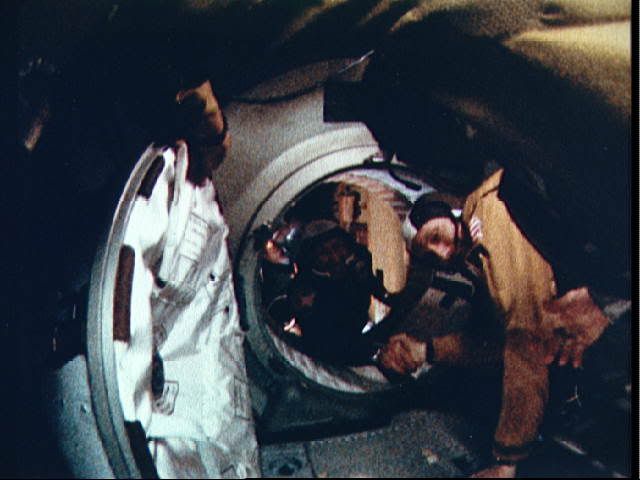 To read the tribute to SFC Marcus Muralles, please click here
To read the tribute to SFC Marcus Muralles, please click here 
Friday, July 15, 2005
Today in History
Thirty years ago today, a Saturn V rocket rose to the heavens from KSC. 45 hours later, the rocket's cargo, an Apollo capsule, docked with a Soviet Soyuz capsule, and the rest, as they say, is history.  That's Alexei Leonov and Tom Stafford, shaking hands, back in a day when Russians and Americans, as a rule, didn't even talk to each other.
That's Alexei Leonov and Tom Stafford, shaking hands, back in a day when Russians and Americans, as a rule, didn't even talk to each other.
When the historical handshake occured, there was hope of future joint missions (and some even hoped for peace between our countries). The next joint mission did not occur for almost 19 years, however, when Sergei K. Krikalev was a mission specialist on Discovery. One year later, on the twentieth anniversary of the ASTP, Atlantis docked with Mir for the first of several joint US/Russian missions to the Russian space station, paving the way for cooperation on the International Space Station.
Today, we're partners with Russia (along with Japan, Canada, and the European Space Agency) on the ISS. Looks like we've come a long way since a wary handshake thirty years ago.
 That's Alexei Leonov and Tom Stafford, shaking hands, back in a day when Russians and Americans, as a rule, didn't even talk to each other.
That's Alexei Leonov and Tom Stafford, shaking hands, back in a day when Russians and Americans, as a rule, didn't even talk to each other. The Apollo-Soyuz (ASTP) mission proved that U.S. and Soviet spacecraft were compatible, despite different measuring systems and air pressure standards. It also more symbolically proved U.S.-Soviet cooperation was possible despite diplomatic tensions.I was only 5 when this happened, so I don't really remember it. But I do remember reading about it when I did get interested in space flight (when I was 7 or 8). I was interested in current events enough that I knew that we didn't get along with the Russians. The whole idea seemed crazy- us? working with them? Nah...
"It was the very heights of the Cold War, with thousands of nuclear weapons aimed at each country," said retired Lt. Gen. Thomas Stafford, who manned the Apollo with Vance Brand and the late Donald Slayton. "Yet both superpowers had great accomplishments in space, so we decided to work together."
"We were able to succeed because we never got into politics," said Valeriy Kubasov, Soyuz' other cosmonaut of the 1975 flight.
When the historical handshake occured, there was hope of future joint missions (and some even hoped for peace between our countries). The next joint mission did not occur for almost 19 years, however, when Sergei K. Krikalev was a mission specialist on Discovery. One year later, on the twentieth anniversary of the ASTP, Atlantis docked with Mir for the first of several joint US/Russian missions to the Russian space station, paving the way for cooperation on the International Space Station.
Today, we're partners with Russia (along with Japan, Canada, and the European Space Agency) on the ISS. Looks like we've come a long way since a wary handshake thirty years ago.


